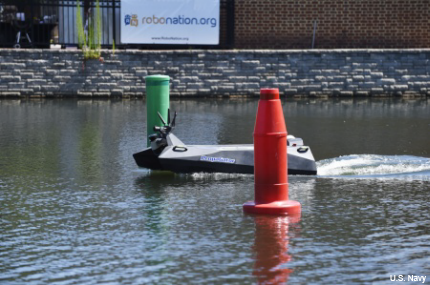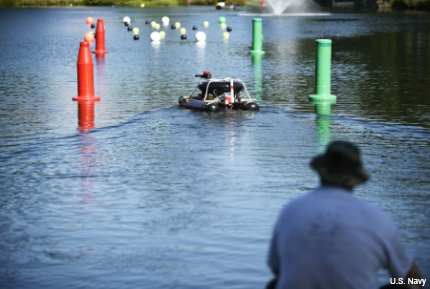RoboBoats show off their moves in ONR competition
The 16-team competition is the latest event in the Navy’s ongoing effort to develop autonomous capability.

The University of Florida's PropaGator navigates RobotBoat’s aquatic obstacle course.
The Navy’s efforts to promote development of autonomous watercraft took another step forward this month, as the Office of Naval Research staged its eighth annual RoboBoat Competition at Virginia Beach, Va.
Sixteen student teams from around the United States and as far away at East Asia put their autonomous surface vehicles (ASVs) through a series of navigational tests, while being rated on their vessels’ design as well as factors such as speed, propulsion and navigation. Embry-Riddle Aeronautical University, which also won the 2014 competition, took first place and the $7,000 prize that went with it.
“Autonomy is a major focus for the Navy today,” Kelly Cooper, a program officer in ONR’s Sea Warfare and Weapons, Ship Systems and Engineering Research Division, said in a news release. “The experiences received here provide students a crucial stepping stone in developing the skills needed to be successful in this important naval career field—these are the scientists and engineers that will undertake the fundamental research and development of our future autonomous naval systems.”
The Navy, and ONR specifically, has been working on adding autonomous capability to unmanned vehicles. Last August, ONR demonstrated its breakthrough CARACaS system can turn just about any boat into an autonomous and/or semi-autonomous vessel capable of working in teams to “swarm” an enemy. ONR has also applied the technology to small unmanned aerial vehicles.
But despite recent successes, autonomous technology still has a long way to go, and competitions such as RoboBoat are as much about developing the next generation of engineers as they are about the current state of the art.
“The successes and challenges students experience via the competition are good preparation for a future in engineering, hopefully for the Navy,” Cooper said. “From completing a run to making onsite adjustments, RoboBoat offers students a firsthand look at what real-life engineers go through when developing and testing Navy technologies for our sailors and Marines.”
ONR presented the student teams with a realistic maritime environment and had them pass through a set of gates, in the process demonstrating visual sensor and guidance integration, obstacle avoidance, automated docking and acoustic beacon positioning, along with their ability to launch and recover of an unmanned aerial vehicle from a moving boat, ONR said.

The University of Central Florida's boat takes a test run.
Florida Atlantic University took second place, winning $4,000. The University of Michigan took third ($3,000) and the Daytona Beach Homeschoolers finished fourth ($2,500). Awards of $1,500 and $1,000 in special award categories also were awarded to the Electronic Engineering Polytechnic Institute of Surabaya in Indonesia, the University of Ulsan in South Korea and the University of Florida.
The RobotBoat Competition isn’t ONR’s only attempt to foster innovation through competition. Last fall, the office sponsored another international contest, the Maritime RobotX Challenge, held in Singapore, in which teams were given identical, 16-foot Wave Adaptive Modular Vehicles and challenged to adapt them to autonomous use.




